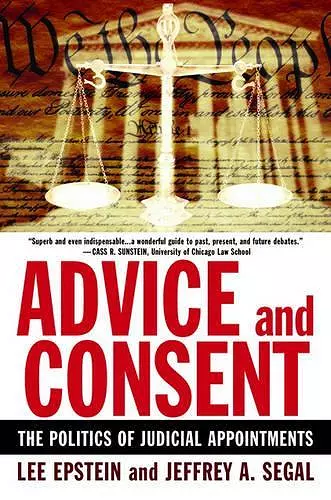Advice and Consent
The Politics of Judicial Appointments
Lee Epstein author Jeffrey A Segal author
Format:Paperback
Publisher:Oxford University Press
Published:22nd Mar '07
Currently unavailable, and unfortunately no date known when it will be back

From Louis Brandeis to Robert Bork to Clarence Thomas, the nomination of federal judges has generated intense political conflict. With the coming retirement of one or more Supreme Court Justices—and threats to filibuster lower court judges—the selection process is likely to be, once again, the center of red-hot partisan debate. In Advice and Consent, two leading legal scholars, Lee Epstein and Jeffrey A. Segal, offer a brief, illuminating Baedeker to this highly important procedure, discussing everything from constitutional background, to crucial differences in the nomination of judges and justices, to the role of the Judiciary Committee in vetting nominees. Epstein and Segal shed light on the role played by the media, by the American Bar Association, and by special interest groups (whose efforts helped defeat Judge Bork). Though it is often assumed that political clashes over nominees are a new phenomenon, the authors argue that the appointment of justices and judges has always been a highly contentious process—one largely driven by ideological and partisan concerns. The reader discovers how presidents and the senate have tried to remake the bench, ranging from FDR's controversial "court packing" scheme to the Senate's creation in 1978 of 35 new appellate and 117 district court judgeships, allowing the Democrats to shape the judiciary for years. The authors conclude with possible "reforms," from the so-called nuclear option, whereby a majority of the Senate could vote to prohibit filibusters, to the even more dramatic suggestion that Congress eliminate a judge's life tenure either by term limits or compulsory retirement. With key appointments looming on the horizon, Advice and Consent provides everything concerned citizens need to know to understand the partisan rows that surround the judicial nominating process.
"This is a superb and even indispensable resource. Careful, precise, objective, and nugget-filled, it's a wonderful guide to past, present, and future debates. If you want to know about judicial appointments, this is the best place to start."—Cass R. Sunstein, University of Chicago Law School
"Thoughtful and illuminating.... Qualifications matter—as much today as they have in the past. (In that sense, President Bush might have done well to read Advice and Consent before nominating the ill-fated Miers.)"—Jeffrey Rosen, Chronicle of Higher Education
"A thorough look at the process, politics and presidential aspects of court appointments. Witty yet well-informed, Professors Epstein and Segal give an insight into the whys and wherefores of federal judge appointments."—www.mayitpleasethecourt.com
"As political scientists Lee Epstein and Jeffrey Segal show in their new and timely book, Advice and Consent, the modern era of politicized nomination battles is nothing new: Politics has suffused the judicial appointment process for 200 years. Writing in pristine, jargon-free language, Epstein and Segal use historical illustrations and the latest quantitative methods to inject some much-needed context and evidence into the current debate about judicial appointments."—Sam Rosenfeld, The American Prospect
"Epstein and Segal's useful primer on the confirmation process makes clear that the American method of choosing federal judges is not always designed to produce moderate candidates. When one party controls both the presidency and the Senate, it gets the chance to alter the legal status quo. Epstein and Segal chart the ideology of presidents against the ideology and voting records of their Supreme Court nominees and show that most justices match up fairly well with their presidents over time."—Emily Bazelon, Washington Post Book World
"There is little doubt that Epstein and Segal are two of the most prominent public law scholars.... They draw together a wealth of research and empirical findings from a plethora of studies, many of which they authored, and fold them into a compelling narrative that examines all levels of the judiciary.... This book combines the best features of past studies on judicial appointments. There are anecdotes to enrich the narrative combined with all manner of empirical results and tables. The book will be a valuable resource for scholars and instructors. It is also very accessible for students and citizens interested in the judicial branch. In addition, this well-written book has the added virtue of being very timely."—Richard L. Pacelle, Jr., Law and Politics Book Review
"An important and timely study that adds an essential framework for understanding contemporary slugfests over judicial appointments. Beautifully presented and argued." —Louis Fisher, author of American Constitutional Law
"Thoughtful.... Provides illuminating details on the history and merits of the confirmation process."—New York Post
ISBN: 9780195315837
Dimensions: 226mm x 145mm x 15mm
Weight: 277g
192 pages